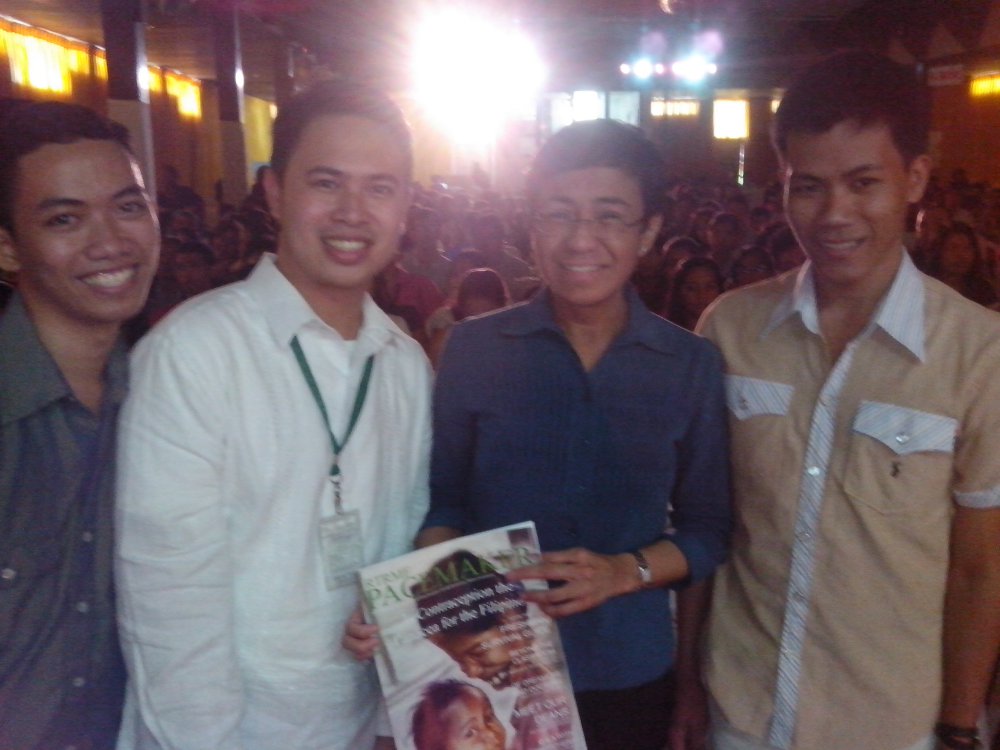Sunday, August 11, 2013
Rappler's Mission: Social Media For Change
I first encountered Rappler's interesting stories on Facebook, very recently the moving story of a coconut farmer's son who graduated Valedictorian of Philippine Military Academy, so when the chance came for our student publication to be invited to Rappler's Chat Series in Baybay, Leyte, I immediately said yes. The idea of social media as a channel for action seemed intriguing, because I am very much aware of the pitfalls of the cyberworld: online bullying, scandals, and scams, could these group of journalists be on to something?
Averting a catastrophe, literally
The theme of the convention was "Social media for Environmental Awareness and Disaster Preparedness", held at the beautiful Visayas State University (VSU) campus. The theme was quite appropriate since VSU was an agricultural school principally, and that our province is among the most prone to natural calamities. However, getting to the venue itself seemed to be such an impossible task and every possible bad thing that could happen did. Strike one: publication members started canceling the night before for one reason or another, strike two: the driver was a no-show and Tacloban to Baybay is quite a long drive and it takes quite formidable driving skills which I do not possess, to traverse the treacherous winding roads of the mountainous central part of Leyte, strike three: the tire literally blew before my very eyes and I had to call for help so it could be vulcanized.
Should we still go? All the signs were telling us not to. If disaster was the theme, this was definitely shaping up to be one, I thought. The very first event officially representing the RTRMF Student publication as delegates seemed hopeless especially only two other die-hard staff members among the original delegation of seven were willing to go.
With little more than guts and determination, we decided we were not going to disappoint. And so started our long drive, and at times getting lost in the towns and roads along the narrow coastline, missing a turn, circling the roads like some madman. Thankfully, we arrived just in time for registration.
"Human Super-organism"
The series of talks started with the state of environment in Eastern Visayas by Dr. Paciencia Milan. The deleterious effects of mining to the environment and the vulnerability of certain towns and cities in the region to certain disasters was also highlighted, recalling the horrors of the Ormoc flashflood and the shocking St. Bernard landslide which resulted from deforestation.
Journalist Voltaire Tupaz followed with methods of reporting disaster stories, with video presentation of PDI columnist Patricia Evangelista's documentaries. The haunting images and portraits of typhoon victims and how their lives were devastated by natural disasters moved the audience close to tears.
The keynote speaker was author and journalist Maria Ressa, former CNN bureau news chief of Manila and then Jakarta, and the CEO of Rappler. Rappler (from the words Rap, meaning talk or discuss, and ripple, to make waves of change) is an organization that recognizes the power of social media, where people are able to reach out and connect with people on a larger scale. Technology now allows us to capture images and videos of natural disasters and events as they happen so we can participate as "citizen journalists", equipped with nothing more than a smart phone, in bringing this information to the front line responders like soldiers and authorities.
By pooling together our efforts and using social media for relaying valuable information, we can coordinate our efforts in being better prepared for disasters and doing our part in saving the environment, creating a "human superorganism" capable of great feats. An example to this was the use of social media Twitter in identifying the extent of devastation and the needs of disaster victims, mapping them out in a span of less than 24 hours. The map, which was generated by tracing the location of "tweets" and the general behavior and real time photos and videos uploaded by residents of affected areas, gave information that no single media network can do.
It remains to be seen if this novel idea would actually yield positive changes in our society- but at least we can heed the message of using social media for good. As for the "three musketeers" from the College of Medicine, we drove our way back home safe and sound, with no landslides or typhoons in our way, a little bolder and braver, and contemplating if there is such a thing as "journalist doctors."
Subscribe to:
Post Comments (Atom)


No comments:
Post a Comment